When we last saw Adonis “Donnie” Creed (Michael B. Jordan) in Creed II, he fought his way to victory under the tutelage of Rocky (Sylvester Stallone) defeating Viktor Drago (Florian Munteanu) for the world championship. In Creed III, Donnie is mostly retired from the sport, living a life of celebrity privilege and leisure in a gorgeous mansion with his family and managing a boxing gym of his own. When his childhood friend Damian “Dame” Anderson (Jonathan Majors) gets out of prison and all but demands a title shot, Donnie finds himself pulled back into the ring.
Composer Joseph Shirley was also eager for a shot — a shot to compose Creed III after serving as Ludwig Goransson‘s Technical Assistant on the first two films, during which he benefited greatly from his guidance and mentorship. Born in Mississippi, Shirley was tapped to compose the third round of the boxing franchise, working closely alongside first-time director Jordan.
After being schooled in New Orleans and earning a degree in music composition, Shirley furthered his musical education by attending the Screen Scoring Program at the University of Southern California. “3” seems to be Shirley’s magic number, as he recently scored Season 3 of The Mandalorian on Disney+ as well as DreamWorks Animation’s upcoming sequel Trolls 3. His other notable credits include The School of Good and Evil, The Book of Boba Fett, and Christopher Nolan‘s Tenet.
Below the Line spoke with Joseph Shirley via Zoom from his recording studio in Burbank, California, and though he calls Los Angeles home these days, you can still hear hints of his charming Mississippi-meets-Louisiana southern twang seeping through in his voice. He was eager to regale with stories about how he spent his formative years fine-tuning his musical education and playing in bands with his brothers, and he also discussed orchestrating Creed III. His sonic palette for the film goes the distance, subtle at one moment and explosive the next, with soaring vocals and operatic sounds to punctuate the drama between Donnie and his opponent Dame.
As much as he enjoyed creating the cues for the boxing scenes, Shirley relished writing the quieter and deeper emotional moments featuring Phylicia Rashad‘s beloved character Mary-Anne. There are even a couple of cues, particularly moments in the ring, that harken back to Bill Conti‘s iconic thematic orchestrations for Rocky, with an updated Shirley twist, of course.
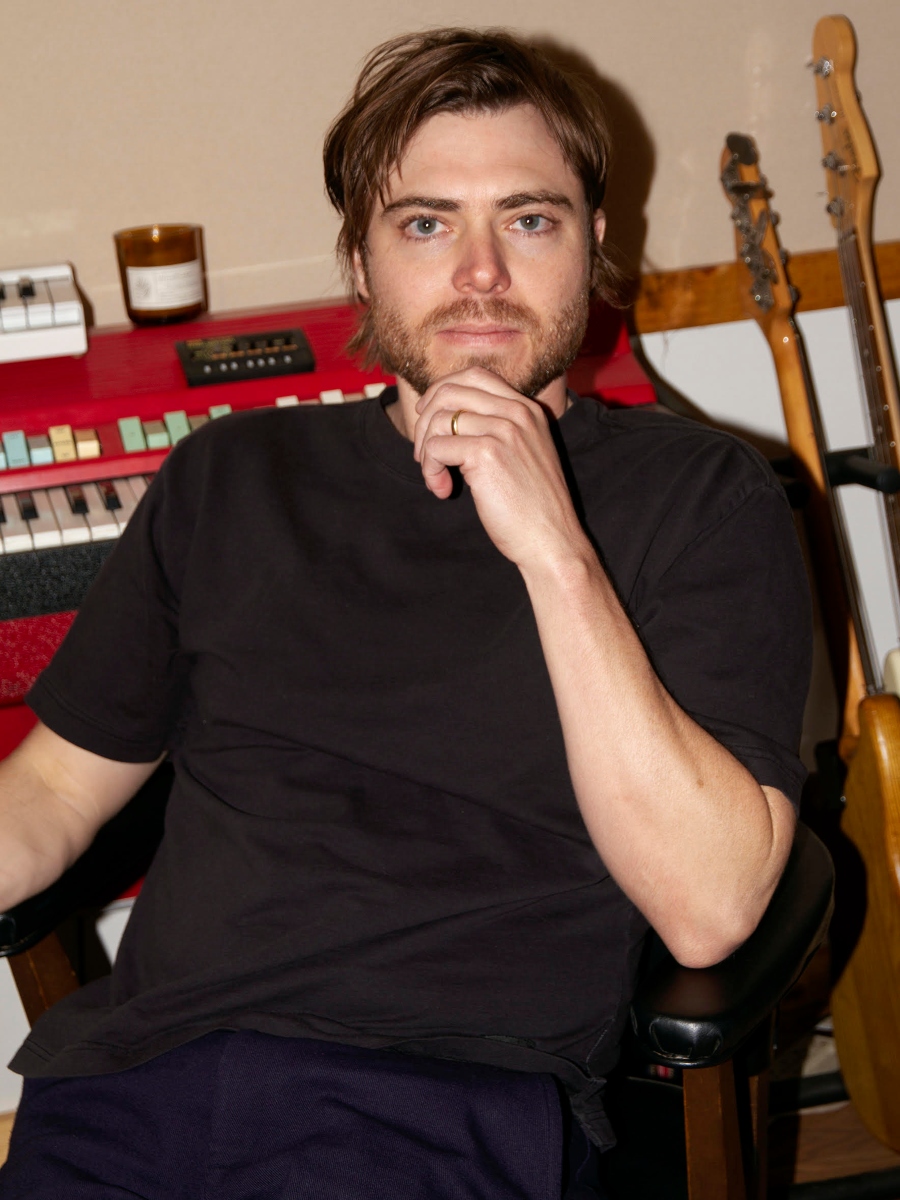
Below the Line: I’m interested in your musical background. Did you come from a musical family?
Joseph Shirley: Definitely. I have three brothers. We all played music together growing up. Much credit goes to my parents for supporting us and pushing us through lessons and everything. But we were always jamming. I was always the keyboard player, and my oldest brother was the bass player. My second-oldest brother was a guitar player, and my younger brother was a drummer. So we had dreams of becoming “The Shirley Four,” you know [laughs].
I will say that in our childhood years, we were jamming and playing a lot. Three of us did start a band while we were all living in New Orleans. We were called “The Cardinal Sons.” I still think that maybe there’s a chance that we could get back together and make some more music. We released three or four EPs and just had a blast doing it; we traveled the country and everything. It was amazing. I love making music with my family, for sure.
BTL: Did you always know what direction you were headed with music?
Shirley: I think I realized probably in high school that I really loved it. My aunt is an amazing, phenomenal teacher. She was an English teacher and such a brilliant lady as far as knowing so much about Southern literature. That’s just a very rich history; lots of great stuff has been written about the South. We would study under her at my high school, and she inspired me and all my friends, and for decades she was just a beloved teacher.
I was taking a creative writing course under her, and she allowed me and my buddies to basically write a movie and shoot it. We decided to make a musical, so I wrote all these songs, and a friend of mine borrowed his parents’ camcorder, and we made a very guerilla-style independent film in 10th grade. It was a musical based on The Adventures of Huckleberry Finn, a classic Mark Twain novel.
It was such a fun process to have my friends come over and record their vocals and all the different cast vocals. Then we would take that and just play it on a boom box wherever we were shooting and mime the vocals on camera and everything. Even though it was a really funny project that we made, it lit this fire in me because I really loved working with music to make pictures. It was just a really exciting discovery, and I’d always wanted to write music.
BTL: You know you’re a rare breed in that you actually went to school to learn how to score for film and television.
Shirley: With this little movie, I knew that I could write music for a visual medium. I went to college, got my undergraduate degree at Loyola University New Orleans, and studied composition. But throughout those four years, I was doing a bunch of student films, local advertisements, and little jingles here and there. I kind of had made up my mind, like, that’s what I’m supposed to be doing through all these funny, funky little projects. As time went on, I went to the USC program, which was really great. I would say [there was] an early seed from that first project, but I always knew I wanted to be writing music.
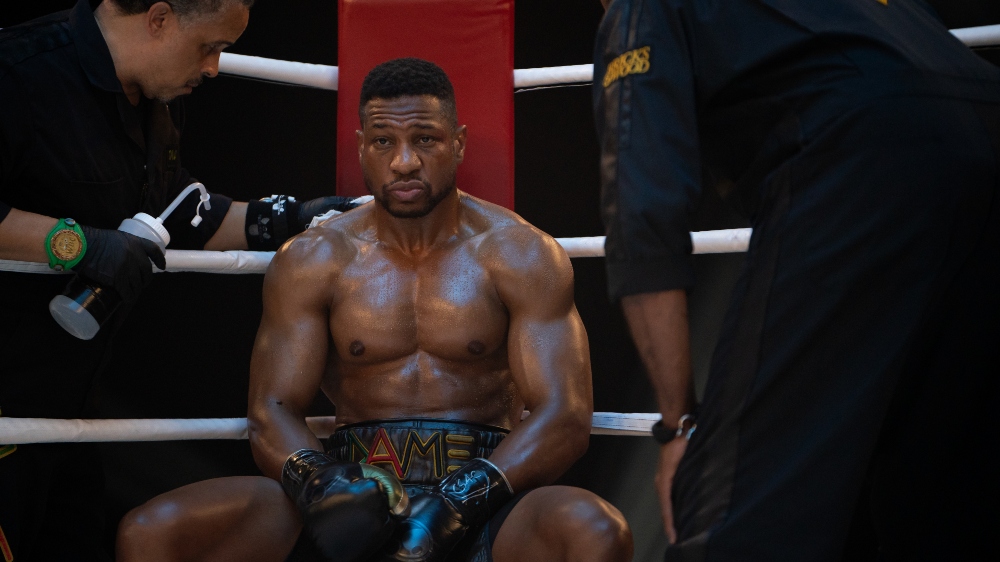
BTL: When you were in the Screen Scoring Program at USC, did that open up a lot of film doors for you?
Shirley: It was a lot of training, and I would say it was a great program just to know the caliber of what film composers do out here in Los Angeles and what is expected of a scoring session. We had a bunch of scoring sessions throughout the school year. It is just a single-year program, but you just record constantly with very professional, top-notch players — the same players who were playing on film scores throughout the week. They’d get with us on a Saturday morning, and we’d have just world-class musicians playing our music and making maybe-not-the-greatest writing sound great. It was a huge learning experience.
The workload was really massive, so it was kind of a wake-up call of, “Okay, you need to be really fast and good and organized and just be really on top of all these different aspects of making a film score.” So that was amazing. Even just being in that culture and seeing how the musicians operate in a scoring session and getting to meet some of them and asking for their tips, help, and advice was valuable. It was really an amazing process just to meet some people that way.
BTL: How did the program lead you to composer Ludwig Goransson?
Shirley: It definitely helped me get in touch with Ludwig, who reached out. He went through the same program before I did. So I think there was like a bit of a home-team connection there with Ludwig, and he needed an assistant, and I definitely needed a job. For me to have gone through something that Ludwig himself had also gone through, there was that connection, too.
BTL: What jobs did Ludwig ask you to assist him with on Creed and Creed II?
Shirley: Ludwig is still a very major part of my career right now. I feel very grateful for that. When he hired me as an assistant, the first movie he was working on was Creed. So it’s totally a full circle moment for me to be involved and for that to be my first movie assisting Ludwig on. And then, over time, just kind of chipping away at whatever needed to be done over the years on all the multiple projects that I assisted him on and backed him up on. I was less technical [than] organizational, [as I focused on] getting us through the recording sessions, making sure the orchestrators had what they needed, making sure the copiers had what they needed, [and] setting up all the sessions. There’s a ton that goes into a film score. There are all these different sessions that need to be prepared and organized in certain ways in order to get [across] the finish line. So those were my duties on Creed. Then, for Creed II, I did a little bit more of the creative. I was helping Ludwig if he needed help here and there.
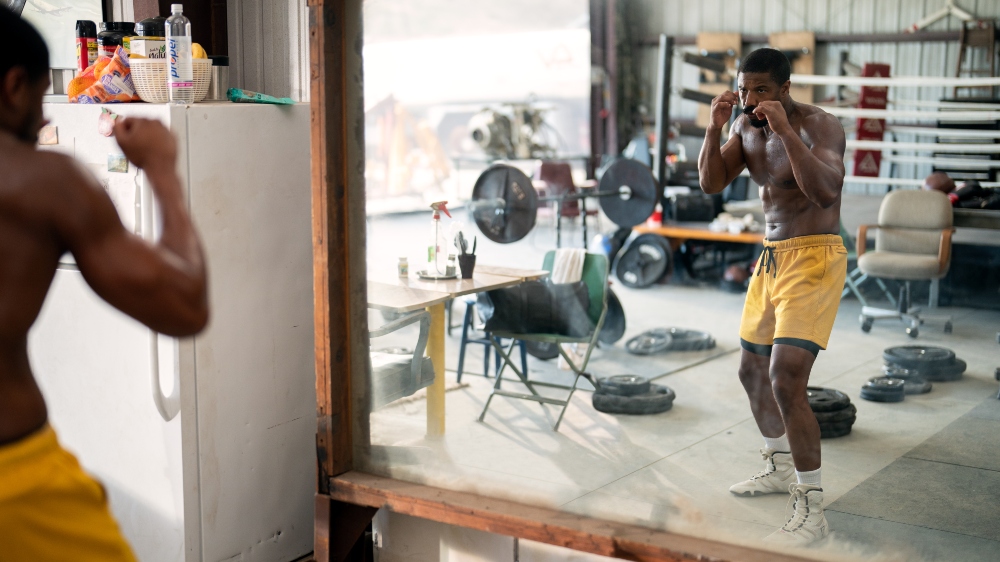
BTL: How did working on Creed III come about?
Shirley: Ludwig was the score producer on Creed III, so he’s still involved. There was a meeting that I took with him just to kind of show him what I was working on and show him how Michael [B. Jordan] and I were kind of expanding upon that sound. He was always very supportive and encouraging. That was great, to have his sort of support and vote of confidence, you know? If I can get my years correct, I think there are three years between them. I think over those three years between Creed and Creed II, between 2015 and 2018, we had done multiple projects that were definitely smaller.
He allowed me to sort of chip away at some additional writing cues under his supervision and everything. [Our relationship] kind of progressed over time that way. I was way more involved and invested in every single aspect of Creed II. That was Ludwig’s beautiful score onscreen, but there were little moments here and there that he allowed me to sort of chip in more creatively. I think it stemmed from having earned a bit more of his trust over those years. So here we are in 2023, five years later.
BTL: In some ways, Ludwig was like your Rocky. He gave you the tools and then you took off on your own in Creed III.
Shirley: [laughs] I definitely knew that it was time for me to try to do something new and try to put my own voice into it while still honoring what he did, and even going back to what Bill Conti did for the Rocky franchise. The Rocky movies have some of the most iconic music ever written, so it was definitely daunting. I’ll admit that I was definitely nervous about it at first, and then as soon as you sort of get into a fun idea and you start writing some music, you start thinking, “Oh, okay, well, this is sort of unlocking some doors. We could kind of go in this sort of direction, see what Michael responds to, and if he likes something like this, maybe we can take that further, you know?”
So as soon as you start getting into more of the creative, [and] getting into the middle of the movie, I felt the anxiety sort of shed away, in a way, which was nice. Thankfully, it felt like I was supporting Michael’s vision, and he was excited about it. It was tricky at first, but once you get closer to the heart of the story, it sort of feels like it opens up a little bit more.
BTL: What was Michael’s input? Did he want, like, an Adonis Creed theme to run throughout the film?
Shirley: Well, everyone knows the Creed theme, and it’s just a fantastic theme. I would go as far as to say it’s iconic, and that’s a theme that I know really well, just being under the hood with Ludwig and just being very familiar with that material. I think Michael responded to my suggestion that we need some new themes. Like, we should harken back to Ludwig’s original theme that follows Adonis, basically, on screen, but we need to acknowledge that at certain points, but we don’t have to do it. We could give it a new spin, and he seemed to like that a lot as far as the progression of Adonis. He’s still in the game, but he’s retired, so it needed a bit of a new sound.
The family dynamics of the Creed family needed a bit of a new sound. Also, given the backstory between him and his childhood friend Dame, they needed a particular sort of gumbo to accompany their story. This story called for a bit of a new flavor, I would say, while still going in that direction [of previous Creed films] and taking on some new thematic material. There were moments where we’d say, ‘Okay, let’s play the classic Creed theme here,’ because it really does center the audience to hear something familiar.
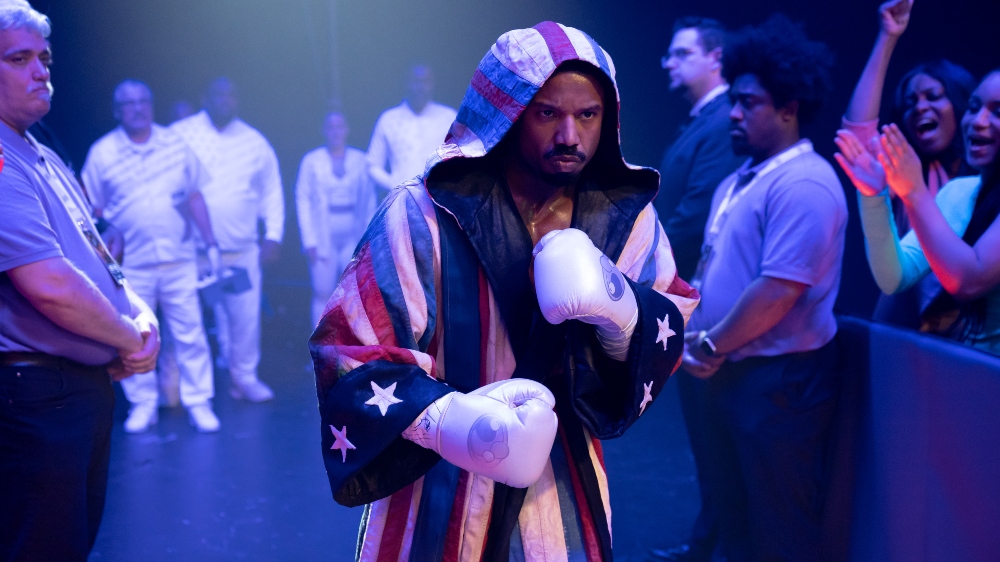
BTL: Speaking of familiar, did you slip in any pieces from Rocky?
Shirley: We used Bill Conti’s “Going the Distance” theme at the end of the movie, and it really is, like, the stamp of this franchise. It’s also at the end of the music cue for “Round 12.” [Spoiler Alert!] It’s after Adonis knocks Dame out. But yeah, we decided to honor the legacy of this franchise by including that material, similar to how in Creed and Creed II, we sort of quoted some of that material in certain ways [during] the final fights.
BTL: I love the term “musical gumbo.” Can you illustrate what that would sound like?
Shirley: For Dame’s character, in particular, it harkens to a bit of a mysterious sort of sound. I just gravitated toward saxophones because I have an affinity for them. I don’t know how to play them, but I just love the sound that a saxophone can make. You can build a lot of different worlds out of a saxophone session. So I had a saxophone come in here to the studio, and we just went to town for, like, a full day, [just] building out samples. He would play very quiet, whispery notes and then play really loud, scary notes. You take that material and process it in certain ways to sort of build out something that feels unique and fun to you.
BTL: Can you describe how you combined vocals with the film’s score?
Shirley: So for Dame’s character, I featured a lot of saxophones as well as vocals. I really enjoy working with vocals, and that’s tipping the hat again, back to what Ludwig did on Creed. There’s some beautiful vocal work that Ludwig sang himself, and I sort of took that idea of having vocals in a film score and kind of used it in different ways, leaning into it a little bit more at times. Vocals played a really large part in the sound that we built for this movie, whether it’s just little shouts here and there, or even, like… once, in the final fight, when it goes into “The Void” [cue], we featured other female vocalists and really went with it in that sort of way.
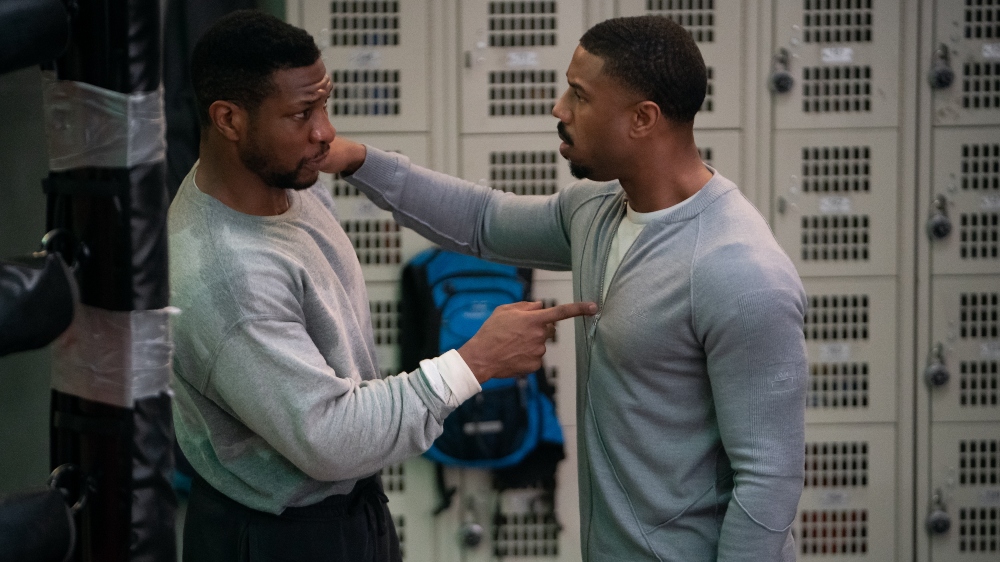
BTL: “The Void” is my favorite cue, by the way. How would you describe what you were trying to achieve in that final fight scene?
Shirley: It’s almost like a horror movie or thriller-type direction while trying to sort of feel like a gladiator. The thing that Michael kept harping on was that he wanted it to feel like performance art, like a Greek tragedy. Like these guys, they are two gladiators fighting till their last, final [ounce] of energy. It really works for how emotional that fight is because they’re dealing with their childhood trauma together. They’re dealing with guilt. There’s so much going on there that it really is a heightened reality. The fact that Michael chose to disperse the whole crowd and it’s just these two guys and the way that they chose to go with the visual effects; it all worked together.
So musically, we took this sort of thriller-horror movie approach and featured a really phenomenal singer, Maiya Sykes, who sang a lot of that material. I also used some new kinds of synths for a more contemporary-sounding film score, at times. When you think of Rocky, it is pop culture. What Ludwig did with the first two Creeds relates a lot to that. There are hip-hop undertones and contemporary production there, and I sort of took that approach with this score, too. It’s a little bit more produced.
BTL: I think the cue for “Felix Walk Out,” where the character of Felix Chavez is walking into the ring to fight Dame, is very contemporary with a Latino feel.
Shirley: That was the first piece of music that I wrote for the movie. While they were shooting in Atlanta, Michael wanted that to be played while they shot Felix’s walkout. You could probably tell if you went back and watched it, but they did time up some of the lighting cues to the music cue that I’d sent him. It didn’t have any vocals on it at that time. We had this amazing singer, Jazz, come in and sing some vocals on it. The lyrics “Vienna poor Sangre” mean he’s coming for the blood. He’s just a total badass, and she went in that sort of direction with some of the vocals, and we were like, “Yeah, let’s go there.” There were some crazy choir vocal shouts that we put into that cue, and it did come together in a fun way.
BTL: You mentioned having that horror movie feel. Many of the cues would just start off so subtly and then just explode.
Shirley: As a composer, I respond to everything visually. However the movie feels, not only are you trying to support the story, but you’re also trying to support the atmosphere that is on display, the feel, the tone, and the aesthetic. The fact that they shot this movie on IMAX cameras really gave it this sort of heightened sense of reality. You could really see every single little bead of sweat on these guys while they were fighting. Even shots cutting to the audience, you know, the way that the movie feels. It just had a more stylized feel to it. We definitely wanted to lean in on moments where it was like, “Okay, we’re going really soft and mysterious and just sort of building suspense, and when the fight’s back on, we’re leaning in 100 percent emotionally.” It’s like a little push and pull. We try our best to just keep folks on the edge of their seats the whole time the fight is going on.
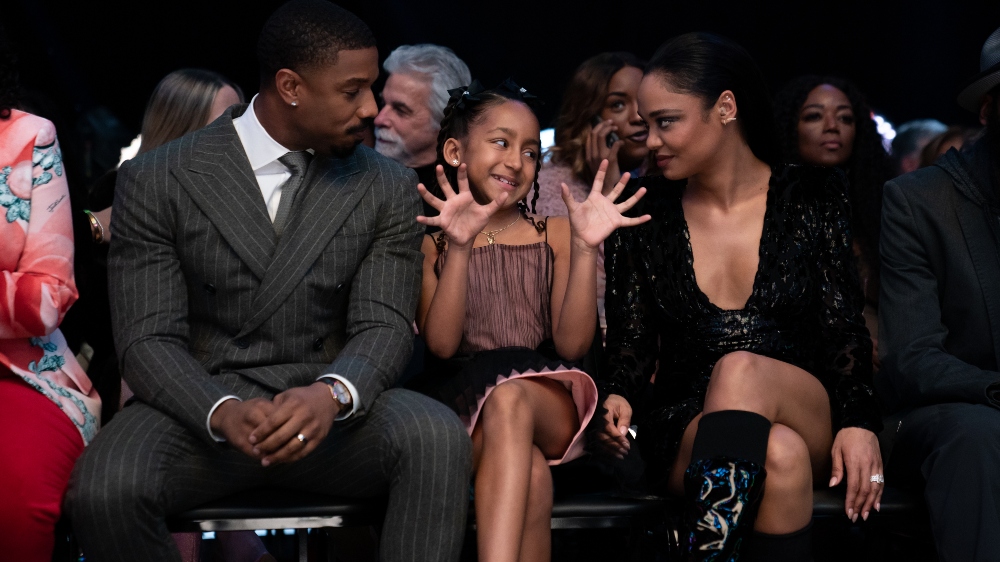
BTL: Were the boxing scenes the most fun to score or the more emotional scenes?
Shirley: I’m a bit of a softie, so the most fun is one of the sad scenes in the movie with the mother (Mary-Ann Creed). It was heartbreaking to score it, to be honest. I was weeping because Phylicia [Rashad’s] character has just been a staple of this franchise, and she was just so beautiful onscreen and [gave] such a beautiful performance. So I felt very connected to her and their relationship, especially because she’s a legacy character, so her treatment musically felt a little bit more like a legacy sound, I’d say.
[Spoiler Alert] For the funeral scene, [the music] feels born out of gospel music or born out of church [music]. It doesn’t go fully in that direction, but it has those sorts of gospel strokes to it. I just really love writing vocal music and then hearing a choir sing it back, and then you sculpt it with them. With the singers, you can really feel the humanity in it. That’s the sad part of the movie, but it is fun, sometimes, to write the gushy, soft cues and the sad ones.
BTL: In a way, the Rocky theme “Gonna Fly Now” can be your theme because it seems like your career has really taken off.
Shirley: Oh my gosh. We will see about that, Robin. I’m just having fun. I just feel so grateful to be working on these amazing projects, and hopefully, the music will resonate with audiences. I’m enjoying the fact that I’m able to work with amazing musicians and legendary producers. I mean, being involved in a movie with Michael B. Jordan and [writer] Ryan Coogler and some amazing musicians, like Ludwig and Archie Davis? These guys are my heroes, you know? It’s very humbling to be working on something with them. But at the same time, I’m just having a blast. It has been a thrill to see how much of a splash this movie has made because I just think it 100 percent deserves it. Michael did a beautiful job with it, and everybody just went full tilt on this movie.
BTL: Coming full circle, how do your brothers feel about your success?
Shirley: One of my older brothers, whose name is John, texted me when the soundtrack went out and he was like, ‘Yeah, man, I’m just raking up the leaves on the patio while listening to your soundtrack. I’m getting really psyched about this yard work I’m doing right now!’ So that was kind of nice. Then my little brothers texted me about it. It’s nice because I’ve made music with them my whole life, and to have them cheering me on from the sidelines is really nice, you know?
Creed III is still playing exclusively in theaters nationwide courtesy of MGM.





